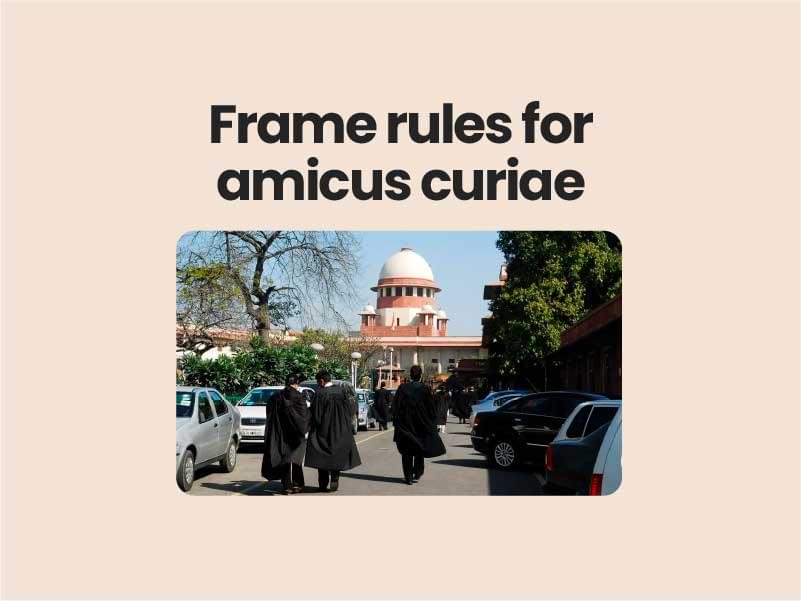Companion@360 → 7 Month programme to sharpen your writing skills → REGISTER NOW

Frame rules for amicus curiae
Solicitor General Tushar Mehta made a strong appeal to the Supreme Court to frame guidelines to rein in lawyers appointed as the court’s amici curiae in various cases, especially sensitive ones. Appearing before a Bench led by Justice N.V. Ramana, Mr. Mehta said court-appointed amici curiae tended to even interfere in the “running” of organisations such as the CBI.
“An amicusis appointed to assist the court… It is time the court frame guidelines to demarcate the role of an amicus curiae,” Mr. Mehta submitted.
Amicus Curiae:
Amicus curiae refers to a person who volunteers to help the court in deciding some matters however it is the discretion of the court whether to accept it or not, the information provided by the amicus curiae could be in the form of brief, testimony which has not been asked by any member of the case, or a learned treatise on the matter before the court.
Procedure To Appoint The Amicus Curiae:
An advocate appointed as Amicus Curiae by the court or from the panel of advocates at the cost of the state shall be entitled to fee at the rate of 6000/- at the admission hearing stage and Rs. 10000/- at the final disposal stage or the regular hearing stage as fixed by the chief justice, or as may be ordered by the court, wherefore a certificate in the form no. 10 shall be issued.
Read Also Virtual court
Role of Amicus Curiae
1. Acting as a counsel / an advocate may be appointed as Amicus Curiae:
In the case of Md. Sukur ali v. State of Assam, for some reason the counsel for the accused did not appear before the court of law, and so one important question that lay before the court was whether they could appoint an amicus curiae for the purpose of defending the accused.
Thus focus was put on the Article 21 and Article 22(1) of the Constitution of India.
Article 21- Protection of life and personal liberty No person shall be deprived of his life or personal liberty except according to procedure established by law. Article 22 (1) – No person who is arrested shall be detained in custody without being informed, as soon as may be, of the grounds for such arrest nor shall he be denied the right to consult, and to be defended by, a legal practitioner of his choice.
Relying upon the two articles of the constitution of India and the judgment in the case of Powell v Alabama, Mr. Nariman held that the accused should not suffer merely because of the fault of counsel and rather he should be provided with Amicus Curiae to defend him in the case as, if the judgment is pronounced without a counsel to defend him that would be gross negligence of the rights which are provided by the Indian Constitution.
Hence an Amicus Curiae was appointed by the court who was a lawyer practicing on the criminal side.
2. Providing assistance in deciding of a case:
In the case of Ali Ibrahim v state of Kerala, the case related to some unknown persons who defrauded the plaintiff to the tune of 63 lakhs of rupees, all the transactions took place via Email and banking transactions, after which it was decided that since this particular case is of grave nature it should be sent to the CBI for further investigation and an Amicus Curiae was appointed, whereby the amicus curiae provided various important aspects of the case and as to how the investigation should be carried forward with respect to the resources and expertise to use in the investigation of the matter, also it suggested that the case should not be given to the National Investigation Agency as is provided under the National Investigation Agency act, 2008 that only the cases which have national ramifications such as terrorism shall be investigated by the NIA.
All of which was accepted by the court.
3. Cases of great public importance:
In the case of Manoj Narula v Union of India and ors. a point of great public importance was brought up before the court and the court appointed Amicus Curiae to assist the court. Broadly the point was about the legality of persons with criminal background or having committed criminal offences appointed as the ministers in the central and state governments.
On the recommendations of who a notice was sent to the Union Government to file the affidavit within four weeks of the service of notice.
Similarly in the case ofPublic Union for civil liberties v. state of T.N. and ors. wherein Kapil Sibal was appointed as the Amicus Curiae, the case related to the gravity of the problem of Bonded labor and steps to be taken to implement the Bonded Labor System (Abolition) Act 1976. All the states were required to organize a survey and the affidavit of the same should be submitted to the Amicus Curiae. The amicus curiae was required to submit brief written statements and all the states were required to comply with the written statements.
Read Also Sedition Law
